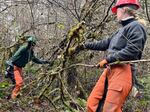In a wildfire, overgrown brush can be the tinder that threatens a nearby home. Now, an Oregon nonprofit is offering to help property owners reduce their risk by clearing it away.

A wildfire protection crew works in Dexter on Nov. 29, 2023.
Nathan Wilk / KLCC
In protective glasses and hard hats, the workers tear their roaring chainsaws into the tangled branches of Lost Valley in Dexter, about 20 miles southeast of Eugene.
This is the Community Wildfire Protection Corps, a three-month paid program for young adults ages 19 to 26. It’s backed by state wildfire funding, and run by the Northwest Youth Corps.
The goal is to build fire-safe buffers around homes and infrastructure, with a focus on landowners who are older, disabled or without financial means. In the process, organizers also hope to train some of the next generation of wildland firefighters.
“NYC is really good about hiring people because of who they are and the values that they hold,” said crew leader Jozie Donaghey. “And if [you’re] interested in learning, they’ll teach you all the other stuff.”
Some crews camp out in the forest during the session, and others commute from Eugene. Donaghey said they learn to work with tools and assess properties for risk, while meeting with veteran foresters.
“It’s a very experience-based profession, working in the woods,” said Donaghey. “And so sometimes getting that initial foot in the door is challenging if you don’t have any experience.”
Making a Difference
When participant Lottie Rohde graduated from high school, they didn’t want to go straight to college. They said this program has shown them there’s other paths to a meaningful career.
“It was kind of daunting at first. Holding a chainsaw for the first time ever is like ‘this is a lot of power that’s in my hands right now,’” they said. “But over the past three months, I’ve gained confidence in my ability to go into properties, see what would be a risk during a fire, what things can stay, and what will thrive more after the work we get done doing.”
Rohde said they’ve seen the impact a crew can make.
“A woman came out, and she was brought to tears, because she hadn’t seen her entire yard in like 20 years, because it was covered in blackberries,” they said. “So seeing it actually brings them joy and happiness, and knowing that they’re going to be safe when the fires come, is really rewarding.”
As they work in the rainy offseason, participants sometimes face uncomfortable weather. But program coordinator Will Wildebrandt said it was then when he felt the most growth and self-reflection.
“Thinking ‘yes, I do feel really cold right now, I am wet right now, I could be inside an office space with a heater,’” said Wildebrandt. “But I’m also working for this person who doesn’t necessarily have the means to do this work on their property, and some things are just larger than myself.”
Trouble Finding Work
To find new properties, the program has formed partnerships with local governments and fire departments. But according to Donaghey, getting work isn’t always easy.
“We are struggling to get property owners in our area to get us to come,” she said. “We are struggling to get diverse community members that are really the marginalized groups we’re trying to reach. We just are struggling to mend that gap of education in our community members.”
Donaghey said some don’t even know the service exists, while others are personally attached to the same trees that might be endangering their homes.
Meanwhile, program consultant Ian Appow said organizers have had to fight the perception that these young adults are underqualified. But he said as word-of-mouth spreads of their results, this is slowly changing.
Donaghey said for those interested in getting involved, being in the woods can be an empowering and healing experience.
“If people are thinking about changing career paths, if they’re in between things, and they need a break, if they’re not sure what they want to do with their lives, which is what most of us in our 20s are kind of dealing with,” she said, “it’s a good transitional period to try something different — it’s just 10 weeks, and I was hooked.”
Funding for the Community Wildfire Protection Corps has been renewed through the end of mid-2025.


